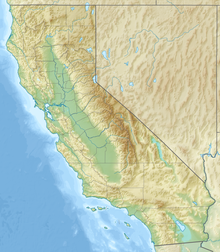| San Gorgonio Mountain | |
|---|---|
 | |
| Highest point | |
| Elevation | 11,503 ft (3,506 m) NAVD 88[1] |
| Prominence | 8,294 ft (2,528 m) ↓ Soledad Pass[1] |
| Isolation | 162.49 mi (261.50 km) → Charleston Peak |
| Listing | |
| Coordinates | 34°05′57″N 116°49′29″W / 34.099162°N 116.824853°W[1] |
| Naming | |
| English translation | Saint Gorgonius |
| Language of name | Spanish |
| Geography | |
| Location | San Bernardino County, California, U.S. |
| Parent range | San Bernardino Mountains |
| Topo map | USGS San Gorgonio Mountain |
| Climbing | |
| First ascent | 1872 by W. A. Goodyear and Mark Thomas |
| Easiest route | Strenuous hike |
San Gorgonio Mountain, also known locally as Mount San Gorgonio, or Old Greyback, is the highest peak in Southern California and the Transverse Ranges at 11,503 feet (3,506 m).
It is in the San Bernardino Mountains, 27 miles (43 km) east of the city of San Bernardino and 12 miles (19 km) north-northeast of San Gorgonio Pass. It lies within the San Gorgonio Wilderness, part of the Sand to Snow National Monument managed by the San Bernardino National Forest.
Spanish missionaries in the area during the early 17th century named the peak after Saint Gorgonius.
Since it is the highest point in a region which is separated from higher peaks (e.g. in the Sierra Nevada) by relatively low terrain, San Gorgonio Mountain is one of the most topographically prominent peaks in the United States. It is ranked 7th among peaks in the 48 contiguous states[2] and 18th overall.[3]
Like other high peaks in the Transverse Ranges, the mountain has a pyramid shape, with a steep north face and a slightly shallower south face. The mountain is large and broad; the summit plateau itself is one square-mile in area (2.6 km2).
In contrast to its spectacular but lower neighbor, San Jacinto Peak, San Gorgonio is not particularly craggy, and from a distance, it appears to be an extremely high hill, earning it the name of greyback. Despite not being particularly striking in appearance during the summer, it is the only mountain in Southern California with a summit a significant distance above the tree line. As such its bright white winter snow cap, unobstructed by vegetation, makes the mountain noticeable from many miles away. The mountain hosts the longest recorded line of sight in the contiguous United States; it is plainly visible from the summit of Mount Whitney, 190 miles (306 km) away.[4]
- ^ a b c "San Gorgonio Mountain, California". Peakbagger.com. Retrieved 2008-11-22.
- ^ "USA Lower 48 Top 100 Peaks by Prominence". Peakbagger.com. Retrieved 2012-04-01.
- ^ "USA Peaks with 6000 feet of Prominence". Peakbagger.com. Retrieved 2012-04-01.
- ^ Longest lines of sight
